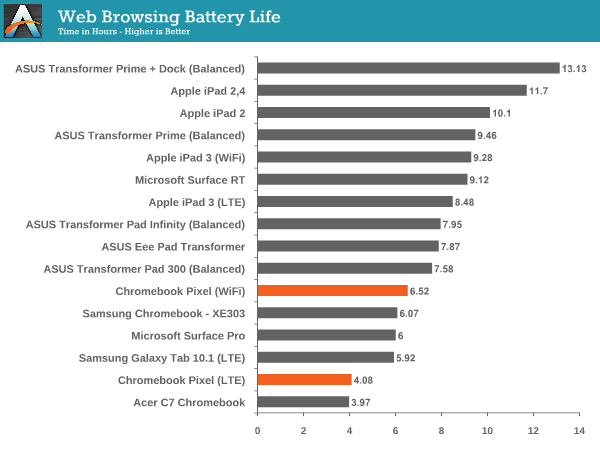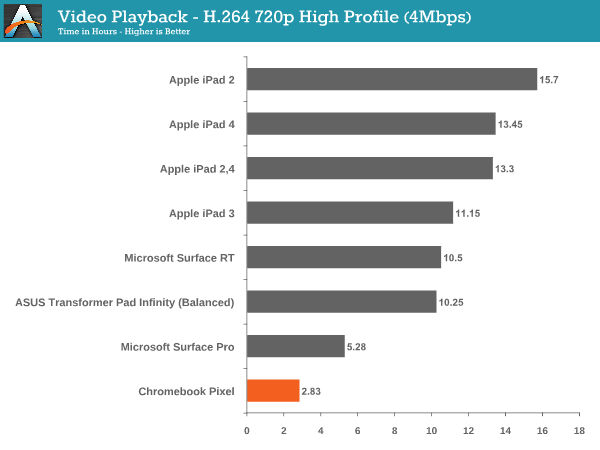The Chromebook Pixel Review
by Jason Inofuentes on May 31, 2013 8:00 AM ESTBattery Life
Like our performance tests, our battery test borrows more from our tablet reviews than it does our notebook reviews. The inability to run any native software here limits us to... well, to the browser. So, we start with our web browsing test. The idea is straightforward, we’re cycling through four websites, disabling any background services that might interrupt the process and setting the display to our customary 200 nits. This test is designed to challenge ARM cores, giving them just enough time to render a page and go back to sleep before asking for the next page. This isn’t as challenging for Ivy Bridge silicon, which is able to complete the render and rush to sleep much faster, which we know can yield better average power consumption and better battery life. The other factor that affects battery life in this scenario is that display. With over 4 million pixels to light up, the panel is going to chew through power a lot faster than something less dense. Only one way to found out how it goes, though.

The Pixel ends up eking out 6.5 hours on WiFi, besting the Surface Pro by a bit, but it’s much more a wash, the larger battery’s added capacity is exhausted by the more power hungry screen. On LTE the Pixel puts up 4.08 hours of stamina; enough for a few hours at a cafe, but not an all day untethered session.
Our video test loops a 720p video encoded with H.264 with an average bit rate of 4 Mbps with the screen once again set at our traditional 200 nits. Running this test on a Chromebook is a little different than any other platform. The video player does exist somewhat outside the browser, but the software is written in HTML5. Hardware accelerated decode of H.264 content is a staple of Chrome and HTML5, though. Right?

This is really awful, and surprising performance. The best explanation we can muster is that an issue in the video player is preventing this file from utilizing hardware decode resources. In that case, decoding and then scaling the video to match the display might tax the system enough to cause this sort of poor performance. If that's the case then an update could drastically impove this score; until then, though, the Pixel does not make for a good media companion on the road.
Ultimately, what we’re really seeing in these charts, is that the rush to sleep advantage Ivy Bridge has over ARM is not enough to overcome ARM’s power envelope. The Pixel’s silicon is a 17W part. Even the most power hungry ARM SoCs in this table clock in below 5W. That’s a deficit that’s going to be hard to overcome... for now. There’s a very real reason to suggest caution in buying anything with Ivy Bridge right now, Anand made the same case in his Surface Pro review. A Haswell alternative in the future should exhibit better battery life, with equivalent performance. There’s also the Atom refresh (Silvermont) to consider; a quad-core Baytrail part could provide plenty of performance while drawing a lot less power than the Ivy Bridge part we’re using today.
Is the Pixel going to let you sit in the park all day, working on the great American novel? No, it won’t. Heck, it might not get you through a longish movie during a flight. If untethered stamina is a prime concern, look elsewhere than really any of the Chromebooks. If you’re near an outlet most of the time, this performance just isn’t great. When you design a thin, modern notebook, you have to make compromises, and in this case, battery life was one of them.










74 Comments
View All Comments
Spoony - Friday, May 31, 2013 - link
No way. It must render the page at 1280x800, scale it up, then over the top draw native text. There is simply no way Jason wouldn't have complained bitterly if all of the text was jaggy.lmcd - Friday, May 31, 2013 - link
You realize that text is always available at high DPI as they're usually scalable vectors, right? But regardless of rendered size they're the same size, right?Oh. Yeah, don't forget that!
tuxRoller - Friday, May 31, 2013 - link
Always love hearing what will never be the case for things that don't involve tautologies:)Selden - Saturday, June 1, 2013 - link
Text is razor sharp.jeffkro - Monday, June 3, 2013 - link
You miss the point of the OS, its a no fuss more secure OS. Sure you can do more with windows but for some people its to complicated. I also don't like the idea of some hacker in Russia hacking into windows and getting all my banking info.Selden - Wednesday, August 7, 2013 - link
@JDG1980 : No, you get razor-sharp text, as shown in a screenshot. I just went through cataract surgery, and I have been able to go down a few points in text sizes, and 10-20% on screen magnification with the Pixel, also lower brightness, which increases battery life.cjb110 - Friday, May 31, 2013 - link
One thing they should port is their new Android Studio!lmcd - Friday, May 31, 2013 - link
Well, that's dependent on the moment on their work with NaCl. Hopefully PNaCl final comes out soon (with the performance promised). That, and I hope Dart turns out. Dart + PNaCl looks promising enough to deliver an Android Studio experience.shompa - Friday, May 31, 2013 - link
I try to think of one single reason to buy Chromebook instead of a rMBP (beside the stupid "I hate Apple").Apple have an OS that is designed for retina displays. Apple have solved the issue with non native resolution by render the original screen at 4 times its pixel count and downscale it make it look good on a 2880x1440 screen.
Why have tons of specs when it cant be used? And 4 gig memory?
I hope that Google releases an Android version of Chroomebook. The same day Android can/is preinstalled on PCs, thats the same day that MSFT for the first time have had competition. Something that all consumers would win by.
mavere - Friday, May 31, 2013 - link
I think they should have went with a slightly slower, cheaper Intel chip and spent that extra money on more RAM. It seems like the software offers the expectation of multitasking that the hardware fails to meet.The Chromebook design screams "I do one thing but I do it well". Uhh not at 4GB RAM, you don't.